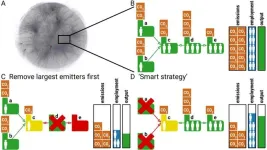(Press-News.org) Philadelphia, April 15, 2024 – Since the implementation of the Healthy, Hunger-Free Kids Act in 2010, school meals in the United States have significantly improved. Several factors have been reported to impact student participation in school meals, including parental perceptions of school breakfast and lunch. A recent research article in the Journal of Nutrition Education and Behavior, published by Elsevier, assessed the association between parent perspectives on the school meal program and student participation.
Researcher Monica D. Zuercher, PhD, MS, Nutrition Policy Institute, Division of Agriculture and Natural Resources, University of California, explained, "Because on average school meals offer better nutrition than other sources of food consumed by American children, maximizing meal participation is a priority."
This study involved 1,110 parents, guardians, and caregivers in California with at least one child in grades kindergarten through 12th grade attending a public or charter school in the state. The sample reflects the characteristics of California school students with regard to race and ethnicity, region, and free or reduced-price meal eligibility. Parents responded to an online survey sharing their feedback on school meals during the school year 2021-22 when school meals were free for all students nationwide. The survey comprised 10 screening questions (e.g., state, county, ethnicity, race, type of school, household size, and household income) to determine eligibility and collect demographic data, followed by 34 questions assessing various aspects of school meal programs. The survey was designed to gather 15 parental perceptions of school meals and was available for self-administration in English or Spanish using Qualtrics software, accessible online via various devices.
Three groups of parental perceptions were identified: (1) positive perceptions (e.g., liking school meals and thinking they are tasty and healthy), (2) perceived benefits to families (e.g., school meals save families money, time, and stress), and (3) negative perceptions (e.g., concerns about the amount of sugar in school meals and stigma associated with low family income or embarrassment). More positive parental perceptions about school meals and their benefits to families were associated with greater student meal participation. In contrast, more negative parental perceptions were associated with reduced student participation in school meals.
Dr. Zuercher commented, "Parent perceptions of school meals appear to influence student participation in school meal programs. Working to ensure parents are familiar with the healthfulness and quality of school meals and the efforts schools are making to provide high-quality, appealing meals may be critical for increasing school meal participation rates.”
END
Parent perceptions of school meals influence student participation in school meal programs
A new study in the Journal of Nutrition Education and Behavior suggests that the way parents view school meals can impact how likely their children are to participate in meal programs at school.
2024-04-15
ELSE PRESS RELEASES FROM THIS DATE:
Hydrogen recombination found to be most plausible explanation for high levels of energy in stellar superflares
2024-04-15
Although their primary purpose is to look for exoplanets, observatories like the Kepler Space Telescope and the Transiting Exoplanet Survey Satellite (TESS) have supplied a vast amount of data on stellar flares, detected with high-precision photometry by broadband filters in the visible light spectrum.
The stars are so far away that they appear only as points of light to these telescopes, and the phenomena interpreted as stellar flares are abrupt increases in the brightness of these points.
There is also a lack of data in other parts of the electromagnetic spectrum, and most studies of these events focus on irradiated ...
Microplastics make their way from the gut to other organs, UNM researchers find
2024-04-15
It’s happening every day. From our water, our food and even the air we breathe, tiny plastic particles are finding their way into many parts of our body.
But what happens once those particles are inside? What do they do to our digestive system?
In a recent paper published in the journal Environmental Health Perspectives, University of New Mexico researchers found that those tiny particles – microplastics – are having a significant impact on our digestive pathways, making their way from the gut and into the tissues of the kidney, liver and brain.
Eliseo Castillo, PhD, an associate professor in the Division of Gastroenterology ...
Unlocking the secrets of forest heights: the role of GEDI LiDAR technology
2024-04-15
A team of researchers has unveiled a novel approach to accurately characterizing tree height composition in forests using the Global Ecosystem Dynamics Investigation (GEDI) Light Detection and Ranging (LiDAR) technology. This study marks a significant advancement in our understanding of forest ecosystems, shedding light on the intricacies of tree height variability and its implications for ecological studies and climate change mitigation efforts.
Tree height composition, a vital ecological attribute, plays a significant role in influencing forest ecosystems, impacting biodiversity, carbon ...
Canada likely to miss WHO's Hepatitis C elimination target, research shows
2024-04-15
Canada will not reach the original World Health Organization's (WHO) target of eliminating the Hepatitis C virus (HCV) by 2030 and lags in comparison to other developed countries, a new study led by researchers at the University of Waterloo has found.
HCV is an infection that poses a major public health threat that affects an estimated 250,000 Canadians – despite having a highly effective medication.
When gone unscreened, HCV is a highly debilitating infection that causes liver failure and could lead to death. Due ...
Pyrite, also known as fool’s gold, may contain valuable lithium, a key element for green energy
2024-04-15
There’s a reason airlines won’t let you put your laptop in your checked luggage; the lithium-ion battery poses a serious fire hazard. But why? Lithium is incredibly reactive. For instance, pure lithium violently interacts with seemingly innocuous water, releasing heat and forming highly flammable hydrogen. This reactivity, however, is exactly why lithium makes a great material for batteries, and why it is a critical mineral for the green energy transition. Lithium-ion batteries are widely used in electric vehicles. Plus, they can store energy produced by renewable resources like solar and wind.
In recent years, lithium demand has skyrocketed. Primary ...
Is there a quick fix for ocean acidification? (video)
2024-04-15
WASHINGTON, April 15, 2024 — Acidification is threatening the ocean’s ability to pull carbon dioxide out of our atmosphere, so scientists and startups are looking to ocean-sized antacids to raise its pH. While they might not be the ultimate solution to our climate crisis problem, the antacids could have a hand in helping our oceans rebound. https://youtu.be/PqFwRMgvMVY?si=1VSbf7zaWbZQ3d25
Reactions is a video series produced by the American Chemical Society and PBS Digital Studios. Subscribe to Reactions at http://bit.ly/ACSReactions and follow us on X, formerly Twitter @ACSReactions.
The American Chemical ...
Reducing CO2 emissions by 20% with only a 2% economic loss
2024-04-15
[Vienna, April 15 2024] — A “rapid and far-reaching change” is necessary to prevent catastrophic climate change, according to the Intergovernmental Panel on Climate Change (IPCC). "However, the transformation of the economy towards climate neutrality always involves a certain amount of economic stress -- some industries and jobs disappear while others are created," explains Johannes Stangl from the Complexity Science Hub (CSH). When it comes to climate policy measures, how can economic damage be minimized?
A ...
Antibiotics aren’t effective for most lower tract respiratory infections
2024-04-15
WASHINGTON – Use of antibiotics provided no measurable impact on the severity or duration of coughs even if a bacterial infection was present, finds a large, prospective study of people who sought treatment in U.S. primary or urgent care settings for lower-respiratory tract infections.
The study by researchers at Georgetown University Medical Center and colleagues appeared April 15, 2024, in the Journal of General Internal Medicine.
“Upper respiratory tract infections usually include the common cold, sore throat, sinus infections and ear infections and have well established ways to determine if antibiotics should be given,” says the study’s ...
Acute cardiac events in hospitalized older adults with RSV infection
2024-04-15
About The Study: In this study over five respiratory syncytial virus (RSV) seasons, nearly one-quarter of hospitalized adults age 50 or older with RSV infection experienced an acute cardiac event (most frequently acute heart failure), including 1 in 12 adults (8.5%) with no documented underlying cardiovascular disease. The risk of severe outcomes was nearly twice as high in patients with acute cardiac events compared with patients who did not experience an acute cardiac event. These findings clarify the baseline epidemiology of potential cardiac complications of RSV infection prior to RSV vaccine availability.
Authors: Rebecca C. Woodruff, Ph.D., M.P.H., of the Centers for ...
Adverse pregnancy outcomes and long-term mortality in women
2024-04-15
About The Study: In a national cohort study of more than 2 million women in Sweden, women who experienced any of five major adverse pregnancy outcomes (preterm delivery, small for gestational age, preeclampsia, other hypertensive disorders, and gestational diabetes) had increased mortality risks that remained elevated more than 40 years later. Women with adverse pregnancy outcomes need early preventive evaluation and long-term follow-up for detection and treatment of chronic disorders associated with premature mortality.
Authors: Casey Crump, M.D., ...
LAST 30 PRESS RELEASES:
A “smart fluid” you can reconfigure with temperature
New research suggests myopia is driven by how we use our eyes indoors
Scientists develop first-of-its-kind antibody to block Epstein Barr virus
With the right prompts, AI chatbots analyze big data accurately
Leisure-time physical activity and cancer mortality among cancer survivors
Chronic kidney disease severity and risk of cognitive impairment
Research highlights from the first Multidisciplinary Radiopharmaceutical Therapy Symposium
New guidelines from NCCN detail fundamental differences in cancer in children compared to adults
Four NYU faculty win Sloan Foundation research fellowships
Personal perception of body movement changes when using robotic prosthetics
Study shows brain responses to wildlife images can forecast online engagement — and could help conservation messaging
Extreme heat and drought at flowering could put future wheat harvests at risk
Harlequin ichthyosis: a comprehensive review of pathogenesis, diagnosis, and management
Smithsonian planetary scientists discover recent tectonic activity on the Moon
Government censorship of Chinese chatbots
Incorporating a robotic leg into one’s body image
Brain imaging reveals how wildlife photos open donor wallets
Wiley to expand Advanced Portfolio
Invisible battery parts finally seen with pioneering technique
Tropical forests generate rainfall worth billions, study finds
A yeast enzyme helps human cells overcome mitochondrial defects
Bacteria frozen in ancient underground ice cave found to be resistant against 10 modern antibiotics
Rhododendron-derived drugs now made by bacteria
Admissions for child maltreatment decreased during first phase of COVID-19 pandemic, but ICU admissions increased later
Power in motion: transforming energy harvesting with gyroscopes
Ketamine high NOT related to treatment success for people with alcohol problems, study finds
1 in 6 Medicare beneficiaries depend on telehealth for key medical care
Maps can encourage home radon testing in the right settings
Exploring the link between hearing loss and cognitive decline
Machine learning tool can predict serious transplant complications months earlier
[Press-News.org] Parent perceptions of school meals influence student participation in school meal programsA new study in the Journal of Nutrition Education and Behavior suggests that the way parents view school meals can impact how likely their children are to participate in meal programs at school.


